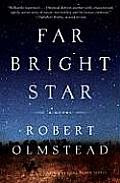Hi Bookmen,
Here are my suggestions for our March book. Two of them, Far Bright Star and The Cellist of Sarajevo, are serious books about war (see descriptions below). Both are relatively short and fairly easy to borrow at the library or purchase on the cheap on line. This Is Where I Leave You is much lighter. Its not as well written, but is a lot of fun. Its a relatively new book, so its tougher to get from the library and might cost you a little more on line. The White Tiger won the 2008 Booker Prize, but don't hold that against it. Its actually a very fun read. I think its pretty easy to borrow or purchase. I can tell you more about the books Wednesday night, if you like.
Doug

Far Bright Star, by Robert Olmstead.




Set in 1916, Far Bright Star follows Napoleon Childs, an aging cavalryman, as he leads an expedition of inexperienced soldiers into the mountains of Mexico to hunt down Pancho Villa and bring him to justice. Though he is seasoned at such missions, things go terribly wrong and the patrol is brutally attacked. After witnessing the demise of his troops, Napoleon is left by his captors to die in the desert.
Through him we enter the conflicted mind of a warrior as he tries to survive against all odds, as he seeks to make sense of a lifetime of senseless wars and to reckon with the reasons a man would choose a life on the battlefield. Olmstead, an award-winning writer, uses his precise, descriptive prose to explore the endurance and fate of the last horse soldiers. The result is a tightly wound novel that is as moving as it is terrifying.
Through him we enter the conflicted mind of a warrior as he tries to survive against all odds, as he seeks to make sense of a lifetime of senseless wars and to reckon with the reasons a man would choose a life on the battlefield. Olmstead, an award-winning writer, uses his precise, descriptive prose to explore the endurance and fate of the last horse soldiers. The result is a tightly wound novel that is as moving as it is terrifying.
 The Cellist of Sarajevo by Steven Galloway
The Cellist of Sarajevo by Steven GallowayA spare and haunting, wise and beautiful novel about the endurance of the human spirit and the subtle ways individuals reclaim their humanity in a city ravaged by war.
In a city under siege, four people whose lives have been upended are ultimately reminded of what it is to be human. From his window, a musician sees twenty-two of his friends and neighbors waiting in a breadline. Then, in a flash, they are killed by a mortar attack. In an act of defiance, the man picks up his cello and decides to play at the site of the shelling for twenty-two days, honoring their memory. Elsewhere, a young man leaves home to collect drinking water for his family and, in the face of danger, must weigh the value of generosity against selfish survivalism. A third man, older, sets off in search of bread and distraction and instead runs into a long-ago friend who reminds him of the city he thought he had lost, and the man he once was. As both men are drawn into the orbit of cello music, a fourth character — a young woman, a sniper — holds the fate of the cellist in her hands. As she protects him with her life, her own army prepares to challenge the kind of person she has become.
A novel of great intensity and power, and inspired by a true story, The Cellist of Sarajevo poignantly explores how war can change one's definition of humanity, the effect of music on our emotional endurance, and how a romance with the rituals of daily life can itself be a form of resistance.
In a city under siege, four people whose lives have been upended are ultimately reminded of what it is to be human. From his window, a musician sees twenty-two of his friends and neighbors waiting in a breadline. Then, in a flash, they are killed by a mortar attack. In an act of defiance, the man picks up his cello and decides to play at the site of the shelling for twenty-two days, honoring their memory. Elsewhere, a young man leaves home to collect drinking water for his family and, in the face of danger, must weigh the value of generosity against selfish survivalism. A third man, older, sets off in search of bread and distraction and instead runs into a long-ago friend who reminds him of the city he thought he had lost, and the man he once was. As both men are drawn into the orbit of cello music, a fourth character — a young woman, a sniper — holds the fate of the cellist in her hands. As she protects him with her life, her own army prepares to challenge the kind of person she has become.
A novel of great intensity and power, and inspired by a true story, The Cellist of Sarajevo poignantly explores how war can change one's definition of humanity, the effect of music on our emotional endurance, and how a romance with the rituals of daily life can itself be a form of resistance.


This is Where I Leave You by Jonathan Tropper.
The death of Judd Foxman's father marks the first time that the entire Foxman family-including Judd's mother, brothers, and sister-have been together in years. Conspicuously absent: Judd's wife, Jen, whose fourteen-month affair with Judd's radio-shock-jock boss has recently become painfully public.
Simultaneously mourning the death of his father and the demise of his marriage, Judd joins the rest of the Foxmans as they reluctantly submit to their patriarch's dying request: to spend the seven days following the funeral together. In the same house. Like a family.
As the week quickly spins out of control, longstanding grudges resurface, secrets are revealed, and old passions reawakened. For Judd, it's a weeklong attempt to make sense of the mess his life has become while trying in vain not to get sucked into the regressive battles of his madly dysfunctional family. All of which would be hard enough without the bomb Jen dropped the day Judd's father died: She's pregnant.
 The White Tiger by Aravind Adiga.
The White Tiger by Aravind Adiga.Balram Halwai is a complicated man. Servant. Philosopher. Entrepreneur. Murderer. Over the course of seven nights, by the scattered light of a preposterous chandelier, Balram tells us the terrible and transfixing story of how he came to be a success in life — having nothing but his own wits to help him along.
Born in the dark heart of India, Balram gets a break when he is hired as a driver for his village's wealthiest man, two house Pomeranians (Puddles and Cuddles), and the rich man's (very unlucky) son. From behind the wheel of their Honda City car, Balram's new world is a revelation. While his peers flip through the pages of Murder Weekly ("Love — Rape — Revenge!"), barter for girls, drink liquor (Thunderbolt), and perpetuate the Great Rooster Coop of Indian society, Balram watches his employers bribe foreign ministers for tax breaks, barter for girls, drink liquor (single-malt whiskey), and play their own role in the Rooster Coop. Balram learns how to siphon gas, deal with corrupt mechanics, and refill and resell Johnnie Walker Black Label bottles (all but one). He also finds a way out of the Coop that no one else inside it can perceive.
Balram's eyes penetrate India as few outsiders can: the cockroaches and the call centers; the prostitutes and the worshippers; the ancient and Internet cultures; the water buffalo and, trapped in so many kinds of cages that escape is (almost) impossible, the white tiger. And with a charisma as undeniable as it is unexpected, Balram teaches us that religion doesn't create virtue, and money doesn't solve every problem — but decency can still be found in a corrupt world, and you can get what you want out of life if you eavesdrop on the right conversations.
